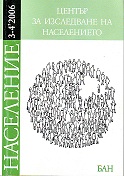ВЛИЯНИЕ НА СЕМЕЙНИЯ СТАТУС ВЪРХУ РАЖДАНЕТО НА ПЪРВО ДЕТЕ В БЪЛГАРИЯ (Форми на семейно съжителство и раждане на първо дете)
UNION STATUS AND FIRST BIRTH IN BULGARIA TRANSITION TO FIRST BIRTH WITHIN COHABITATION VS. MARRIAGE
Author(s): Dora Kostova Subject(s): Social Sciences
Published by: Институт за изследване на населението и човека - Българска академия на науките
Summary/Abstract: During the socialism the pattern of union formation was early and nearly universal marriage. According to the census* in 2001 13.1% of the population in reproductive age lives in non-marital union. A big part of these cohabitations belong to the ethnic minorities hence a relatively small but increasing part are „young cohabitations“ (Center for Population Studies, 2001). Second important issue is swift and considerable increase in extra-marital fertility – from 12% in 1990 to 42% in 2001. These changes raise an important question: to what extents are non-marital births occurring within cohabiting unions? Using the recent data from the survey Coping Strategies, Social Capital and Fertility (2002) in Bulgaria we examined the effect of union formation, union status at first birth and educational level along with the other variables known to be important on the timing and likelihood of a woman to have a first child after entering the first union. The results provide support to our hypotheses that it is more likely to have a child in a marital union than in cohabitation and we can expect postponement of first birth in cohabitational union in comparison with that of marriage.
Journal: Население
- Issue Year: 2006
- Issue No: 3-4
- Page Range: 65-82
- Page Count: 18
- Language: Bulgarian
- Content File-PDF

